| 2015 Q2 | story by KATHERINE DIAZ | photos by STEVEN HERTZOG |
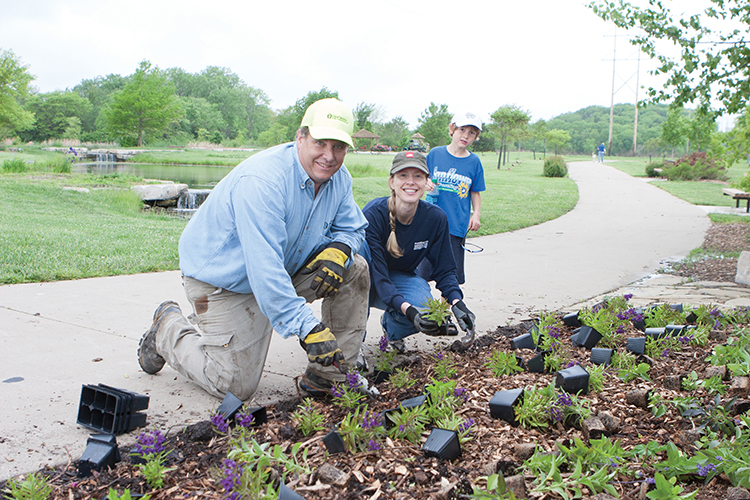
Rotarians helping maintain the Lawrence Rotary Arboretum.
Someone was taking a shower. Vickie Randel could hear the water running – but then, abruptly, the water would stop. A few minutes would pass and Randel would hear the water running again. On and off the water would run and shut off, but that was how Evelyne would take her shower. The conservation of water was essential to Evelyne, but for Randel, it was the first time she viewed the use of water differently.
“It was the first time I had experienced that approach to water in person,” Randel recalled, about 12 years later. “I’d read about it, I’d heard about it, but I didn’t give any credence to it because I had never seen it.”
Evelyne had been one of five individuals visiting from Senegal, West Africa through the Rotary Group Study Exchange program. It has since changed, but at the time, the program consisted of two groups of four or more individuals who would travel to one another’s country, but specifically to its Rotary District. Rotary members within the district would host these individuals and Randel, who currently serves as Assistant Regional Rotary Foundation Coordinator, had been one.
Since 1991, Randel has been a devoted Rotarian, providing time and energy to the worldwide organization of Rotary. For Randel, Evelyne reinforced the concept that there are still many who need aid and assistance, and Rotary is the best organization to accomplish this.
In 1905, in the bustling city of Chicago, Paul Harris launched the first Rotary Club meeting, which consisted of five businessmen, each man from a different profession.The vision Harris held for this organization was to gather, cooperate and learn from one another in a professional and organized manner. By 1909, Rotary was a national movement where clubs now spanned from San Francisco, Calif. to New York City, N.Y., and it now had a new priority – to do and bring good to the community. As the years came to pass, Rotary continued to grow and by 1928, it had extended worldwide. Today, there are approximately 1.2 million dedicated Rotary members across the globe, who not only contribute their time in meetings, but in volunteering to provide assistance to others locally and worldwide.
“We are an organization who prides itself in our philanthropy,” said Beverly Billings, President of the Lawrence Rotary Club. “Rotary International is a philanthropic organization – it’s a service organization and our motto is ‘Service Above Self,’ and so we all try to live that in our daily lives and in our work.”
Rotary works at the local, national and international level. Locally in Lawrence, three clubs exist which are the Lawrence Rotary Club, Jayhawk Breakfast Rotary Club and Lawrence Central Rotary. Each club is consistent with its goals and overall mission, but where it differs is each club has its own agenda and approaches a variety of community projects. The major differences of the three clubs, however, are the locations and times of its meetings. These meetings are held weekly and host professional guest speakers, but the membership of each club varies.
“We have roughly 190 members and about 100 to 120 who come every Monday, and so it’s a wonderful venue for University of Kansas people, community people, even statewide people to come and talk about a particular topic,” Billings said.
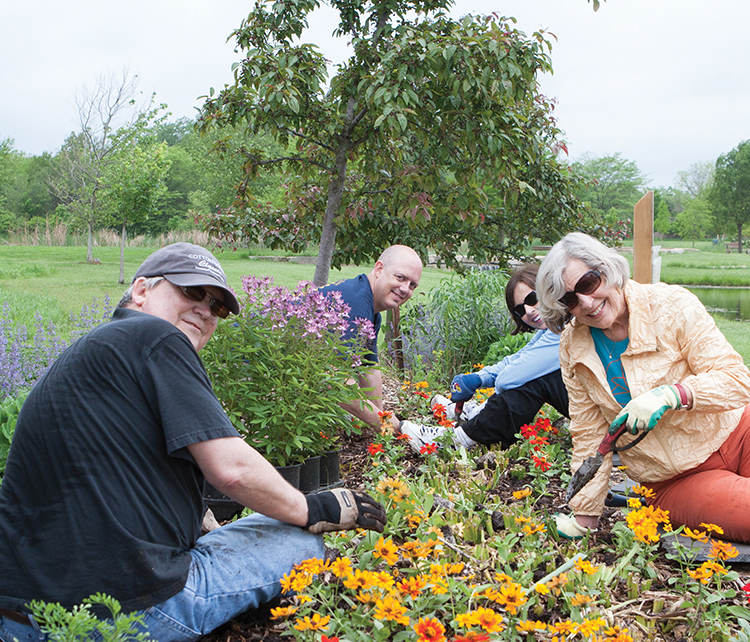
The first Rotary club was found in 1905 in Chicago by Paul Harris.
Rotary is divided up into geographic regions, according to Randel. The starting point being the Rotary club, the club is then part of a district, the district is part of a zone and the world is divided into 38 zones, lastly Rotary International encompasses all. So while Billings serves as president at club-level, Randel serves at the zone level.
“My responsibilities at that level have to do with being a liaison for clubs and districts, and assisting them with Rotary Foundation matters and fundraising,” Randel said. “That’s my official work and then I have a district assignment.”
The Rotary Foundation is a separate corporation, which supports the activities of Rotary International, Randel stated. This organization has lived up and beyond its goals and its mission “Service Above Self,” as one of its major projects is the eradication of polio worldwide.
“Rotary International’s most well-known philanthropy is PolioPlus,” Billings said. “We not only contribute money, but send Rotary teams all over the world to inoculate children with the polio vaccine. So it’s a huge endeavor that we work on throughout the world.”
Rotary, in its existence, has accomplished what other organizations have been unable to do, which is to provide consistent and organized worldwide aid. Two main reasons justify why Rotary has had such success in helping each other and others locally, nationally and globally. According to Randel, one is it has no political affiliation or agenda, and the second is it has no religious affiliation, in other words, it’s secular and has no religious inclination or character. This has enabled Rotary to be much more effective than any organization can be that does have such an affiliation. In today’s world, that factor is more important than ever because Rotary has a huge volunteer force – the largest organization in the world of volunteers, according to Randel.
“We’re able to do things to help people in countries where an organization with a political bent or religious affiliation would not be allowed to do their work,” Randel said. “[People in another country] don’t have to fear what we’re doing there; they don’t have to wonder about ‘are we trying to convince them to try to do something,’ are we trying to convert them to some religion or some political ideology.’ We simply go in as volunteers and bring assistance to their people.”
This year, 2015, marks the 110th year of Rotary’s existence, but what has truly made this organization successful has been the strong dedication of its members throughout the years.
“We have some people who are our heart and soul, and who have been part of our club literally for decades and decades,” Billings said. “We have a wonderful tradition and legacy in terms of our club members and our club history.”
It was 1948 when Buck Newsome first joined Rotary in Elizabeth City, N.C. His second Rotary Club was in Brunswick, Ga., and his third was the Lawrence Rotary Club in 1958 when he became the Professor of Naval Science at KU.
“It was a good way for a particular military man, who moved around quite a bit, to get re-established in the community,” Newsome said.
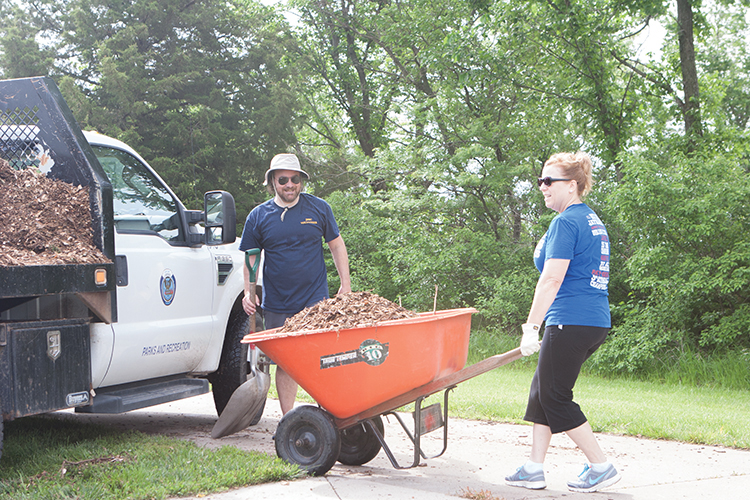
Polio Plus is one of the biggest projects Rotarians contribute to.
Since joining Rotary, Newsome has served as President of the Lawrence Rotary Club and became District Governor of Rotary for eastern Kansas, and his family’s legacy in Rotary goes beyond that still.
“My dad was a Rotarian and started the first Rotary Club in Durham, N.C.,” Newsome said. “He ended up being the President of Rotary International, and was gone for about a year, he and mother, traveling all over the world.”
Newsome’s father imbued the value of serving others at a young age, and due to his commitment to the organization Newsome has been witness to some of the greatest changes in Rotary’s history. One being the classification system, in which each club had one, or possibly two individuals in each profession, such as a lawyer, a banker, an engineer, etc. Now, that classification system is lost, and one will find several individuals representing a single profession. The second greatest change was the acknowledgement of women into Rotary.
“Our club had an ordeal about bringing women into Rotary,” Newsome recalled. “Former mayor, who was a Rotarian, resigned when he found out they were bringing women in – he was against it as did some other people.”
Times have changed, however, and today there are more young women than young men who are Rotary members, according to Newsome. Throughout its history and its legacy, Rotary has demonstrated its ever-lasting dedication to the improvement of local communities, disaster-stricken countries and development of countries.
“There’s a saying in Rotary that when a country needs help, they don’t have to call Rotary because Rotary is already there,” Randel said. “We have such capacity and such leverage because we work together and we don’t work against each other.”
Whether Rotarians have come together to support those during Hurricane Katrina or building a library in New Orleans for homeless or primarily homeless adults, Rotary holds its values in high regards of serving others above all.
“When you’re at a point in your life when you’re pretty well settled, know what you’re all about and if something seems to be missing a little bit in your life, you could think about joining an organization like Rotary, whose motto ‘Service Above Self’ is apparent. It’s a good way of utilizing your talents in an organized fashion to do organized good, rather than just going out and haphazardly doing something different everyday,” Newsome said. “It’s a good way of contributing to your community and to your city and to the world, really. We all owe something, it varies with each of us, but make sure you’re willing to commit yourself – don’t go in half-heartedly and then fall out.”

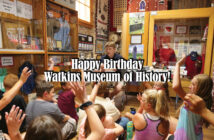

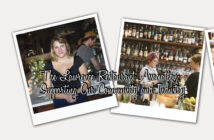
4 Comments
Thanks for your article on the vacation industry. I might also like to include that if you’re a senior considering traveling, it’s absolutely essential that you buy traveling insurance for older persons. When traveling, golden-agers are at biggest risk of experiencing a health care emergency. Receiving the right insurance package for one’s age group can protect your health and give you peace of mind.
Thanks for your post. I also think that laptop computers have become more and more popular right now, and now will often be the only sort of computer utilised in a household. The reason is that at the same time actually becoming more and more reasonably priced, their working power keeps growing to the point where there’re as powerful as desktop coming from just a few in years past.
Medyum Haluk hoca
Good day! I could have sworn I’ve been to this blog before but after going through many of the posts I realized it’s new to me. Regardless, I’m certainly delighted I discovered it and I’ll be bookmarking it and checking back regularly!